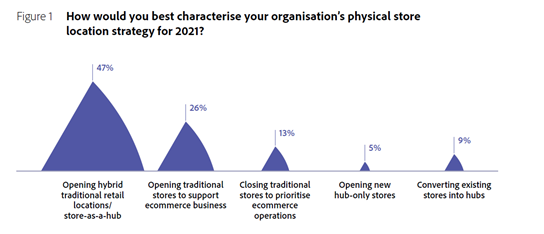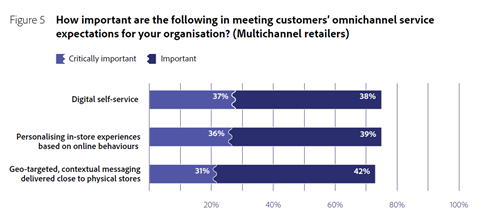Digital transformation is a must for the retail industry

Adobe, together with Econsultancy, has published the report Digital Trends 2021: Retail in Focus. The basis for this year’s 11th edition was a survey of retailers, primarily multichannel and e-commerce businesses. The report examines their strategies and analyses the differences between the best-performing companies and those in the mainstream. It looks at how the retail industry has changed as a result of the pandemic, as well as the trends within the industry.
All companies have faced similar challenges: the shift to remote work, the adaptation to changes in consumer behaviour, the influx of digital customers, the need for greater convenience and security. It is worth mentioning that more than two-thirds of companies providing a positive customer experience achieved better results in the second half of 2020. They were as much as three times more likely to achieve “significantly better results” than other companies.
The report points to an acceleration of digital transformation, with mobile technologies becoming increasingly important. The latter will respond to the challenges of changing consumer behaviour, with personalisation playing a big role in delivering a better customer experience.
Changing consumer behaviour accelerates shift to new sales channels
The events of 2020 have become an accelerator for digital transformation, requiring retailers to adapt to changing consumer trends as quickly as possible. In the US, the share of e-commerce in total sales grew by around 1% year-on-year between 2009 and 2019. However, in 2020 alone, there was a surge of as much as 17% (from 16% to 33%).
The survey shows that retailers are focusing on adapting or converting traditional shops to support e-commerce. For half of omnichannel retailers (47%), the main strategy for stationary retail will now be to open hybrid shops that cater to both stationary and online shoppers. This is also to influence as few physical interactions with and between customers as possible.
The events of 2020 have become an accelerator for digital transformation, requiring retailers to adapt to changing consumer trends as quickly as possible. In the US, the share of e-commerce in total sales grew by around 1% year-on-year between 2009 and 2019. However, in 2020 alone, there was a surge of as much as 17% (from 16% to 33%).

The survey shows that retailers are focusing on adapting or converting traditional shops to support e-commerce. For half of omnichannel retailers (47%), the main strategy for stationary retail will now be to open hybrid shops that cater to both stationary and online shoppers. This is also to influence as few physical interactions with and between customers as possible.
Focus on the mobile experience
According to the study, in November and December 2020, traffic from mobile devices accounted for 60% of traffic and 40% of sales in US shops. The impact of mobile solutions on customer experience will lead retailers to invest in mobile solution (49%) and mobile apps (40%) in 2021. The use of mobile is also expected to reduce the number of interactions between people in the shop. More than a quarter (28%) of omnichannel retailers say this is one of their top two priorities for the future.
Walmart’s Scan & Go app is an example of how a retailer can combine different channels to create a contactless, integrated customer experience through a greatly simplified purchase process. Customers can easily locate, scan and purchase products directly from their mobile phones, bypassing queues and avoiding the need to touch self-service checkout screens. Such apps also ‘free up’ shop staff to educate customers about mobile shopping and provide additional customer service, which can lead to increased sales.
The need to be flexible
The survey shows that many retailers are aware of the need to react quickly to changes in the company environment and to be flexible. More than half (57%) of retailers surveyed agree with the statement that they were very free to experiment and innovate within the company in the second half of 2020. What’s more, nearly four in five (79%) retail respondents say they were extremely agile and quick when it came to the actions they took.
Fast decision-making, relies on good communication, and this has been particularly important over the past year when the pressure to meet sales targets has been greatly increased by the need to close traditional shops. More than two-thirds of respondents said that the level of communication between teams was exceptionally high in the second half of 2020.
Overcoming technological challenges for a better customer experience
The pandemic has accelerated the use of online channels, even among retailers who had previously shied away from them. Around two-thirds (65%) reported a remarkable increase in new customers – compared to non-retail respondents, among whom the number was not even half (46%). Respondents from the retail sector were also far more likely than others to report an increase in website visits (69% to 60%). Brands that already had e-commerce also had to change their approach. The London Transport Museum was cited as an example. Following the long-term closure of its gift shop, it re-platformed its e-store on Adobe Magento 2 in July 2020, resulting in a 62% increase in online sales in the second half of 2020.
Greater personalisation and digital self-service will shape the future of retail
In a digital world where everything is almost ‘at your fingertips’, waiting for customer service seems increasingly passe. When asked about the most important factors to meet customer service expectations, 75% of retailers ranked digital self-service as ‘important’ or ‘very important’.

Automation and technology are helping to reduce contact between shop visitors. An example of this is the app introduced by Home Depot. By switching to ‘shop mode’, customers can quickly identify which aisle a particular product is in, and if they had trouble finding it anyway, a sales associate is available to them online at the click of a button. The in-store mode feature is reliant on geotargeting, a capability that almost three quarters (73%) of respondents to the survey consider ‘crucial’ or ‘important’ for delivering the right experience at the right time.
The importance of personalising the in-store experience based on online consumer behaviour (deemed ‘key’ or ‘important’ by 75% of respondents) highlights the need to integrate not only marketing technology but also CRM and POS systems. The requirement for personalisation also means the need to modify legacy IT systems, which are seen as the biggest obstacle to delivering the best possible customer experience. This problem is much more noticeable for omnichannel retailers (37%) than for those operating solely online (20%). For some companies, the solution is to ‘reboot’ using a new, unified platform. However, few retailers can start from scratch – 40% are looking to link new solutions to existing systems.
The 4 key findings of the study are that retailers must:
- be flexible in the face of changes that may arise suddenly;
- leverage mobile and digital self-service to be perceived as innovative;
- have the technology to create integrated personalisation;
- focus on hybrid strategies (applies to omnichannel retailers).
Solutions offered by Exorigo-Upos
At our company, we have years of experience in serving retailers, including leaders in their segments. We offer innovative solutions (online as well as offline) to support digital transformation.
Among online solutions, we offer implementation and maintenance of the Magento e-commerce platform (we are an official technology partner of Adobe, its owner). Thanks to its advancement, it is an extremely popular software for e-shops, used by almost one-third of e-commerce companies worldwide. A huge number of built-in functions and additional modules allow you to meet customer expectations and provide the best possible consumer experience.
Another tool that supports companies in digital transformation is the innovative NetTickIT system. One of its functions is to link offline and online channels by presenting enhanced information (in digital form, on a smartphone screen) for products available on the shop shelf. For more information about NetTickIT, see our article.
We also develop UX-based solutions for mobile devices. We encourage you to read the article, which presents how the principles of UX influence the increase of conversions for mobile applications and websites.
At Exorigo-Upos, we can also work with the client (using various workshop methods) to develop solutions from scratch to ensure the improvement of their business and the most successful customer experience.

